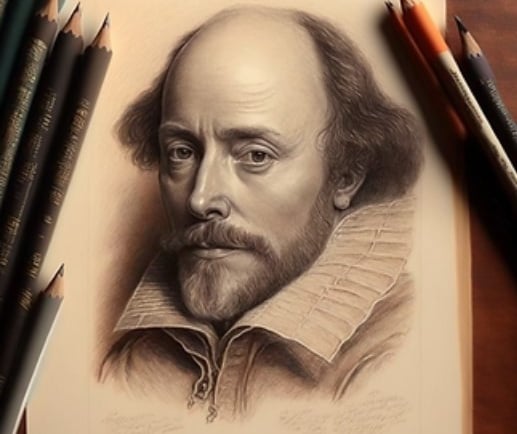
10 Influential Literary Movements
Throughout history, (western) literary movements have had a profound effect on the world, but what exactly is a movement?
WRITING
S.C. Farrow
1/15/202310 min read


Throughout history, (western) literary movements have had a profound effect on the world, but what is a movement? In a nutshell, it is a group of writers who share similar aims, years of publication, similar goals, ideas, philosophies, and (often) a particular location. From the religion inspired texts of the Medieval Era to the avant-garde texts of the 20th century, these movements have left their mark on the way we think, write, and understand literature. In this blog post, we'll look at ten important literary movements that influenced the world in a variety of ways, from changing the way authors wrote stories to inspiring generations of readers. From the Dark Ages to Postmodernism, let's explore some of the most influential literary movements that have shaped the world.
MEDIEVAL ERA AND THE DARK AGES
The Medieval Era is a period in literary history that lasted from roughly the 4th century to the 15th century. During this time, literature was mainly concerned with religious topics and authored by writers with a religious background. During this time, the primary written language of Europe was Latin. As a result, many authors of this period were primarily Latin authors, although there were writers in other languages as well.
The Medieval period was an era of transition in which Christian beliefs began to take precedence over pagan beliefs. Authors of this period focused on topics such as morality, religion, and the afterlife. Some of the most important authors of this period include Dante Alighieri, Geoffrey Chaucer, and Marie de France.
The Middle Ages is often referred to as the “Dark Ages” because it was a period of relative political instability and social turmoil. This period was marked by widespread poverty and a lack of education for many citizens. As a result, much of the literature from this era is characterised by dark themes and superstitions.
The Medieval period is considered one of the most influential literary movements in history and has had a lasting impact on modern literature. Many of the works from this period remain influential today and continue to inspire authors and writers from all walks of life.
RENAISSANCE
The Renaissance period began in the fourteenth century and was an important time for art, literature, music, and philosophy. It marked a new era of intellectual and cultural exploration and is often seen as a bridge between the Middle Ages and Modernity. During this period, European culture underwent a major shift in its sociopolitical landscape, and literary movements played a key role in this transformation.
The Renaissance was a period of great change, when writers began to focus on themes of humanism, individualism, secularism, and beauty. It was during this time that many of the world’s most renowned writers, including Geoffrey Chaucer, William Shakespeare, and Christopher Marlowe, rose to fame. This period also saw the emergence of a new type of literature known as “humanist literature” which was concerned with exploring the human condition. Writers during this time sought to challenge long-standing social conventions and explore the value of human life. They also looked to classical antiquity as an example of beauty and moral excellence.
The Renaissance also had a great impact on the world’s literature. Themes such as individualism, humanism, and beauty were embraced by writers from all over Europe. These themes shaped how people wrote and how literature was understood. This period also saw the emergence of the field of sociology which focused on understanding societies through research and analysis. The Renaissance’s influence can still be felt today in how literature is written, interpreted, and understood. It is a testament to how literary movements can greatly influence and impact the world.
ENLIGHTENMENT ERA
The Enlightenment Era was a period of intellectual and scientific revolution in the eighteenth century that laid the foundations of modern western thought. Characterised by advancements in science, new ideologies, and the emergence of rationalism, this period saw a shift away from traditional religious views and an emergence of new literary movements. The Enlightenment Era marked an important period in the development of Western civilisation, inspiring new ideas and critical thinking.
The main characteristics of Enlightenment Era writing included a focus on reason, a scepticism towards religious and philosophical doctrines, and a commitment to progress. Writers during this period sought to question previously held beliefs and traditions and embrace a spirit of critical inquiry. This could be seen through their use of satire, irony, and wit in their works. Writers such as Voltaire and Diderot used humour to challenge authority and religious dogma. Enlightenment Era literature often focused on topics such as politics, philosophy, science, economics, and history.
Literary movements during the Enlightenment Era also had a profound influence on contemporary writers. The Age of Reason was an important movement that sought to replace superstition and traditional customs with scientific principles and facts. The Empiricist school of thought explored the idea of acquiring knowledge through evidence-based experience. This period also saw the emergence of the Neoclassical movement which used ancient Greek and Roman literature as inspiration for new works.
The Enlightenment Era was an important period in the development of literature that shaped many of the literary movements we see today. Writers during this period sought to challenge existing beliefs and traditions while embracing the power of critical thinking and reason. Through their works, these writers inspired countless contemporary authors who continue to explore these same themes.
ROMANTICISM
Romanticism was a literary movement which began in the late 18th century and extended into the early 19th century. This literary movement brought about a shift in the focus of literature from the rational, scientific, and objective aspects to a more subjective and emotional approach. Romanticism also rejected Enlightenment values of reason, order, and restraint, and instead celebrated individual imagination, intuition, feeling, and passion.
Writers and authors during this period wrote with an appreciation for nature, emotion, and individuality. These authors sought to move away from traditional forms of literature and create works that expressed their own unique perspectives on life. Through their writing, these authors influenced the world by introducing new ideas on what is important in life, such as love, beauty, joy, and spirituality. Romanticism had a profound impact on literature in the years since its emergence, and it continues to shape modern literature today.
The hallmarks of Romanticism include the focus on the natural world, emotion, imagination, and individualism. Writers of the period sought to emphasise the importance of these characteristics and to demonstrate the power of art and literature to shape society. Authors such as Lord Byron, Johann Wolfgang von Goethe, and William Wordsworth were prominent during this time, and their works have left a lasting mark on the world.
Through their works, these authors influenced the world by introducing new ideas on what is important in life, such as love, beauty, joy, and spirituality. To this day, Romanticism remains one of the most influential literary movements of all time.
VICTORIAN ERA
The Victorian Era (1837–1901) is characterised by a shift in literature towards realism and an atmosphere of moral seriousness. During this era, authors explored the human experience, morality, and social reform.
One of the most popular genres during the Victorian period was Gothic fiction, a style characterised by mystery and the supernatural. This genre often explored themes of dread and the macabre. Authors such as Mary Shelley and Edgar Allan Poe were known for their dark and suspenseful works that helped to define this literary movement.
Another genre that gained prominence during this period was the sensation novel, a popular form of literature written by authors such as Wilkie Collins and Charles Dickens. These stories explored the drama of everyday life, often featuring sensational events and characters from all walks of life. Overall, the Victorian Period played an important role in shaping modern literature and literary movements. Through its exploration of the human experience and its fascination with Gothic and sensation novels, it has left an enduring legacy on literature and culture.
Aestheticism in literature is a literary movement that emerged during the Victorian era of the 19th century. It was a reaction to the industrial revolution, during which authors and writers were able to express their individualism. The aim of Aestheticism was to bring beauty and art into everyday life through literature. Authors such as Oscar Wilde and Walter Pater are among the most notable figures in this movement.
The characteristics of Aestheticism included emphasising the beauty of nature and art, advocating for self-expression and individualism, and celebrating sensory experiences such as colour, sound, and smells. The movement also focused on expressing emotions and feelings through the use of romantic and poetic language. Aesthetics in literature often used symbols or metaphors to communicate meaning and strove to capture the beauty of both nature and art in the written word.
NATURALISM
The naturalist movement seeks to explain the world using scientific principles and to examine the effects of social determinism and heredity on behaviour. Naturalistic writers often employ a pessimistic worldview, with stories exploring topics such as poverty, crime, and despair. Naturalist authors commonly address problems such as substance abuse and mental illness, highlighting the consequences of an individual’s inability to cope with their environment.
Examples of famous authors associated with the Naturalism movement include Gustave Flaubert, Emile Zola, Stephen Crane, and Jack London. These authors are known for their vivid storytelling and bold characters, pushing the boundaries of what was acceptable in literature at the time. Characteristics of Naturalism literature include detailed descriptions of everyday life, use of dialect to accurately portray a character’s speech, and an objective approach to storytelling.
The Naturalism literary movement was ground-breaking in its time, paving the way for a new generation of writers and stories. By focusing on characters’ behaviour based on their environment, Naturalist writers opened up conversations about topics that had previously been considered taboo. As one of the most influential literary movements of all time, Naturalism continues to shape the way we think about literature today.
REALISM
Realism is one of the most prominent literary movements that shaped the world in the 19th century. It arose as a reaction to Romanticism, which was a movement based on emotion and idealism. Realism was about capturing life as accurately as possible and was first seen in French literature in the 1840s.
Writers during the realism period sought to depict everyday life realistically rather than focusing on fantastical stories or romanticised portrayals of people and their lives. Realist authors presented complex social issues through their work by exploring the various characteristics of their subjects, such as their motivations and values. They sought to provide an honest representation of reality and to highlight the importance of social issues in the lives of ordinary people. Realism has since become an important part of literature and continues to be used by writers today.
Some authors have continued to explore realistic aspects of society in their works, while others have used it as a basis for more abstract literary movements. For example, some writers have combined elements of realism with aspects of fantasy, creating new kinds of works with unique characteristics. Writers such as Virginia Woolf and E. M. Forster also helped bring modernism into focus, furthering the idea of literature as a form of expression beyond just providing accurate representations of life.
Today, many writers use realism as a tool to create works that explore both real-life situations and characters with deep emotional depth. From its inception in the 19th century to its influence on modern writers, realism remains an important literary movement that has significantly impacted our understanding of society and culture.
BEAT GENERATION
The Beat Generation was a literary movement that originated in the mid-1950s and early 1960s and was closely associated with the American counterculture of the time. Writers of this period were known for their rejection of conventional forms of literature, as well as their innovative ideas about how to write and express themselves. These writers sought to redefine literary conventions and challenge societal norms through their work. The most notable writers associated with this movement are Jack Kerouac, Allen Ginsberg, and William S. Burroughs, who all influenced the world of literature through their works.
Characteristics of the Beat Generation included an emphasis on living spontaneously, drug experimentation, non-conformism, and an appreciation for jazz music. Their writing style often featured stream-of-consciousness narrative, dreamlike imagery, and spontaneity. The Beats sought to push the boundaries of literature, embracing topics that had not been discussed openly before. Through their writing, they raised awareness of issues such as mental health, racism, materialism, and spirituality.
Overall, the Beat Generation played an important role in the development of modern literature, paving the way for future generations of authors to explore new ideas and approaches to writing. Its influence can still be felt today in the works of countless contemporary authors who continue to push boundaries in their writing.
MODERNISM
Modernism is a literary movement that emerged in the late 19th and early 20th centuries. It was a reaction against the strict conventions of Realism and the traditional values of Romanticism. In literature, modernism rejected the structure and content of traditional literature and instead focused on creating new forms of expression that explored previously unexplored ideas, themes, and topics.
Modernist authors were greatly influenced by Sigmund Freud's theories of the unconscious and often wrote in fragmented forms that explored the power of dreams and the depths of the human mind. The characteristics of Modernist literature include stream-of-consciousness writing, fragmentation, experimentation with narrative structure, free-verse poetry, and a focus on the psychological impact of language. Modernist works often challenge traditional values and ideals, resulting in an ambiguous and often non-linear plot structure.
Writers like T.S. Eliot, James Joyce, Virginia Woolf, and William Faulkner are considered some of the most influential modernist authors. Creative experimentation was at the heart of Modernism, and the movement pushed the boundaries of art and literature. During this period, the focus shifted from representing reality to the creative process itself, and authors and writers experimented with new forms and techniques to create works that had never been seen before. The characteristics of Modernism have been hugely influential in the literary world, and its impact can be seen in the works of countless authors and writers even today.
POSTMODERNISM
Postmodernism is a literary movement that began in the mid- to late 20th century and has heavily influenced contemporary literature. It is often characterised by its focus on fragmented structures, irony, and a lack of certainty or knowledge. Its authors challenge conventional ideas and ideologies, while creating works that are often highly reflective of society’s current state. Writers such as Toni Morrison, Salman Rushdie, and Thomas Pynchon are among the most influential authors of the postmodern era.
Postmodernism was heavily influenced by modernism and ultimately changed the landscape of the literary world. While modernism focused on order, structure, and the interpretation of certain symbols and motifs, postmodernism favoured fragmentation, satire, and irony. Postmodern literature often revolved around topics such as identity, race, gender, power dynamics, and morality.
Interestingly, one of the characteristics of postmodernism is an awareness of its own existence as a movement – it is an acknowledgment that writers at the time were aware that they were living in a period of transition, both in terms of literature and in terms of their lives. This movement was influential in changing the way authors saw themselves and their place in the world.
The era of postmodernism also marked a time when writers around the world began to explore new styles, themes, and methods of storytelling. The emergence of postmodern literature changed the way we view literature, giving readers more options for engaging with texts than ever before. By opening up new possibilities for authors to explore and to challenge readers’ expectations, postmodern literature has had a lasting impact on the way we think about literary movements and their ability to influence the world.
Literary movements
List of literary movements
Major literary movements in English literature


© 2026. All rights reserved
In the spirit of reconciliation, we acknowledge the Traditional Custodians of Country throughout Australia and the Torres Straight Islands and their connections to land, sea, and community. We pay our respects to elders past and present and extend that respect to all First Nations and Torres Strait Islander peoples today.
ABN: 19 569 432 238





